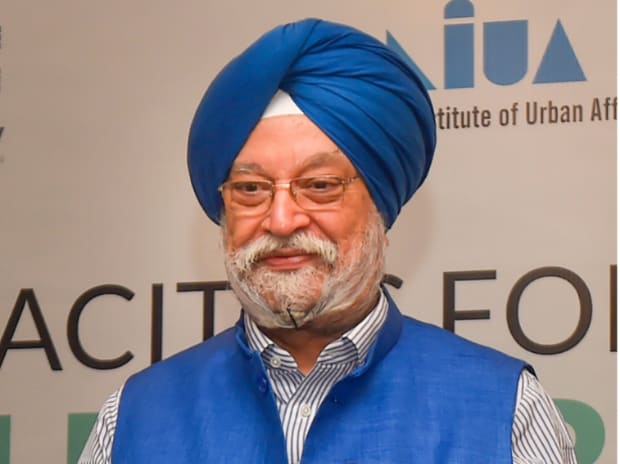[ad_1]
Six non-BJP ruled states — West Bengal, Tamil Nadu, Andhra Pradesh, Telengana, Kerala and Jharkhand — have not reduced the VAT on petroleum products, leading to higher prices of petrol and diesel there, Petroleum Minister Hardeep Singh Puri said on Thursday.
Puri said in Lok Sabha that the central government has reduced excise duty on petroleum products and some other states, following cues, reduced their Value Added Tax (VAT).
Six states — West Bengal, Tamil Nadu, Andhra Pradesh, Telengana, Kerala and Jharkhand — have not reduced the VAT, he said amidst vocal protests by the opposition members.
“Some of them are charging VAT at the rate of Rs 17 and other non-BJP states are charging at Rs 32. So, there is a differential. When the member was saying that today the cost of petrol is Rs 100 per litre in some places — in some places which are non-BJP states — and in other states, it is Rs 8-10 cheaper,” he said.
The minister said, currently the petrol price in India is one of the lowest.
He said the oil marketing companies together suffered losses of Rs 27,276 crore due to high prices of crude in international markets.
“I suggest MPs from the opposition impress upon their state governments to reduce the VAT they can then join the mainstream celebration,” he said.
Puri said India imports more than 85 per cent of its crude oil requirements. Therefore, the prices of petrol and diesel in the country are linked to their respective prices in the international market.
He said the retail prices of petrol and diesel depend on various factors like crude oil purchase price, exchange rate, shipping charges, inland freight, refinery margin, dealer commission, central taxes, state VAT and other cost elements.
While the average price of the Indian basket of crude oil increased by 102 per cent (from USD 43.34 to USD 87.55) between November 2020 and November 2022, the retail prices of petrol and diesel have increased in India by only 18.95 per cent and 26.5 per cent during this period, respectively.
The minister said prices of petrol and diesel have not been increased by public sector Oil Marketing Companies (OMCs) since April 6, 2022, despite record-high international prices.
“As a result, against the combined ‘profit before tax’ of Rs 28,360 crore in H1 of the financial year 2021-22, the three OMCs, IOCL, BPCL and HPCL, have booked a combined loss of Rs 27,276 crore in H1 of the current financial year 2022-23,” he said.
Puri said to insulate Indian consumers from the impact of high international crude oil prices, the central government reduced the central excise duty twice on November 21, 2021, and May 22, 2022, effecting a cumulative reduction of Rs 13 and Rs 16 per litre for petrol and diesel respectively, which was fully passed on to the consumers.
Following these reductions in central excise duty, some of the states and Union Territories also reduced value added tax rates on petrol and diesel.
The minister said India imports more than 60 per cent of its domestic LPG consumption. The price of LPG in the country is based on the Saudi Contract Price, the benchmark for the international price of LPG.
Saudi CP rose from 236 USD/MT in April 2020 to 952 USD/MT in April 2022 and continues to prevail at elevated levels currently.
However, he said, the government continues to modulate the effective price to consumers for domestic LPG.
Public sector oil marketing companies have suffered huge losses on the sale of domestic LPG and to compensate for these losses, the government has recently approved a one-time compensation of Rs 22,000 crore to OMCs.
Unsatisfied with the minister’s reply, members belonging to Congress, DMK, TMC and NCP staged a walkout of the house.
(Only the headline and picture of this report may have been reworked by the Business Standard staff; the rest of the content is auto-generated from a syndicated feed.)
[ad_2]


